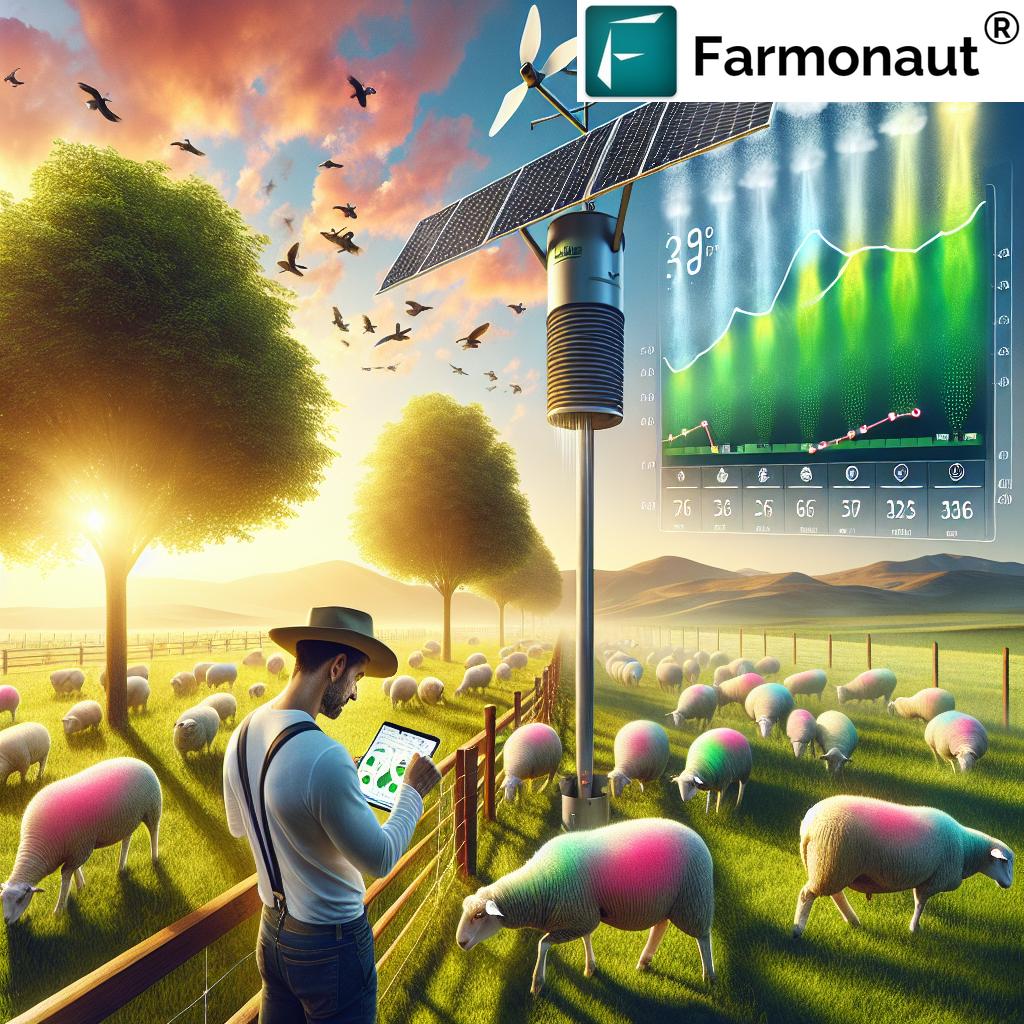Sustainable Sheep Farming in Hot Weather: Farmonaut’s Guide to Heat Stress Management and Precision Agriculture

“Sheep can lose up to 10% of their body weight in a single hot day due to heat stress.”
Welcome to Farmonaut’s comprehensive guide on sustainable sheep farming in hot weather conditions. As climate change continues to impact agricultural practices worldwide, it’s crucial for livestock farmers to adapt and implement effective strategies for heat stress management. In this blog post, we’ll explore how precision agriculture technology can revolutionize sheep care during hot weather, ensuring the health and productivity of your flock while promoting sustainable farming practices.
At Farmonaut, we understand the challenges faced by sheep farmers in managing their livestock during extreme heat. Our mission is to make precision agriculture affordable and accessible to farmers worldwide, integrating innovative technology and data-driven insights into traditional farming practices. Through this guide, we’ll share valuable information on identifying signs of heat stress in sheep, implementing effective management strategies, and leveraging smart farming techniques to enhance sheep care in hot weather.
Understanding Heat Stress in Sheep
Heat stress is a significant concern for sheep farmers, particularly in regions experiencing rising temperatures due to climate change. Sheep are susceptible to heat stress due to their wool coats and limited ability to dissipate heat through sweating. Understanding the signs and impacts of heat stress is crucial for effective management.
Signs of Heat Stress in Sheep
- Rapid breathing or panting
- Lethargy and reduced movement
- Decreased feed intake
- Increased water consumption
- Seeking shade or crowding in shaded areas
- Open-mouth breathing with extended neck
- Drooling or foaming at the mouth
Recognizing these signs early is crucial for implementing timely interventions and preventing severe health issues in your flock.
Impacts of Heat Stress on Sheep Health and Productivity
Heat stress can have significant negative impacts on sheep health and farm productivity:
- Reduced feed intake and weight gain
- Decreased milk production in lactating ewes
- Impaired reproductive performance
- Weakened immune system, increasing susceptibility to diseases
- In severe cases, heat stress can lead to mortality
Given these potential consequences, implementing effective heat stress management strategies is essential for maintaining the health and productivity of your sheep flock.
Farmonaut’s Approach to Heat Stress Management in Sheep Farming
At Farmonaut, we leverage advanced technologies to support farmers in managing heat stress in their sheep flocks. Our precision agriculture solutions provide real-time data and insights that can be crucial in implementing effective heat stress management strategies.
Satellite-Based Monitoring for Sheep Farm Management
Farmonaut’s satellite-based crop health monitoring technology can be adapted for livestock management, providing valuable insights into pasture conditions and environmental factors affecting your sheep:
- Vegetation health monitoring (NDVI) to assess pasture quality and availability
- Soil moisture level tracking to identify potential water sources and optimize grazing patterns
- Temperature mapping to identify cooler areas within your farm for strategic sheep placement
By leveraging this data, farmers can make informed decisions about grazing management, water provision, and shelter placement to mitigate heat stress risks.
AI-Driven Advisory System for Sheep Care
Our Jeevn AI Advisory System can be tailored to provide personalized recommendations for sheep care in hot weather conditions:
- Real-time weather forecasts and heat stress alerts
- Customized feeding and watering schedules based on environmental conditions
- Recommendations for adjusting shelter and shade provisions
- Guidance on optimal times for handling and moving sheep to minimize heat stress
These AI-driven insights enable farmers to proactively manage their flocks and implement timely interventions to prevent heat stress.
Effective Strategies for Heat Stress Management in Sheep
Implementing a comprehensive approach to heat stress management is crucial for maintaining the health and productivity of your sheep flock. Here are key strategies that can be enhanced through the integration of Farmonaut’s precision agriculture technology:
1. Optimizing Ventilation in Sheep Shelters
Proper ventilation is essential for regulating temperature and humidity in sheep shelters, especially during hot weather.
- Design shelters with adequate openings for natural airflow
- Install fans or misting systems for additional cooling
- Use Farmonaut’s weather data to automate ventilation systems based on real-time conditions
2. Managing Hydration
Ensuring access to clean, cool water is critical for preventing dehydration and heat stress in sheep.
- Provide multiple water sources throughout grazing areas
- Monitor water quality and temperature regularly
- Use Farmonaut’s soil moisture data to identify potential natural water sources on your farm
3. Nutrition Management During Summer
Adjusting feeding practices can help sheep cope with heat stress more effectively.
- Shift feeding times to cooler parts of the day
- Provide high-quality, easily digestible feed to reduce heat production from digestion
- Use Farmonaut’s vegetation health monitoring to assess pasture quality and adjust supplementary feeding accordingly
4. Shade Provision
Access to shade is crucial for sheep to escape direct sunlight and regulate their body temperature.
- Establish natural shade through strategic tree planting
- Install artificial shade structures in pastures
- Use Farmonaut’s temperature mapping to identify and utilize naturally cooler areas on your farm
“Implementing precision agriculture techniques can reduce water usage in sheep farming by up to 30%.”
5. Monitoring and Early Intervention
Regular monitoring of your flock is essential for early detection and management of heat stress.
- Conduct daily visual checks for signs of heat stress
- Use Farmonaut’s AI advisory system to receive alerts on high-risk weather conditions
- Implement a protocol for rapid intervention when heat stress is detected

Leveraging GIS and Remote Sensing for Sheep Farm Management
Geographic Information Systems (GIS) and remote sensing technologies play a crucial role in modern precision agriculture, including livestock management. Farmonaut’s platform integrates these technologies to provide valuable insights for sheep farmers:
1. Pasture Management
- Use satellite imagery to assess pasture health and productivity
- Identify areas of overgrazing or underutilization
- Plan rotational grazing strategies based on vegetation data
2. Water Resource Management
- Map water sources and evaluate their accessibility
- Monitor soil moisture levels to predict water availability
- Plan water infrastructure development based on spatial analysis
3. Heat Stress Risk Mapping
- Create thermal maps of your farm to identify heat stress risk zones
- Plan shade and shelter placement based on temperature data
- Analyze microclimates within your property for optimal flock management
Explore Farmonaut’s API for advanced data integration
Adapting Agricultural Practices to Changing Weather Patterns
As climate change continues to impact global weather patterns, adapting agricultural practices is crucial for sustainable sheep farming. Farmonaut’s technology can assist farmers in this adaptation process:
1. Climate-Smart Breeding Programs
- Use data analytics to identify heat-tolerant sheep breeds
- Implement breeding programs aimed at improving heat resistance in your flock
- Monitor and evaluate the performance of different breeds under varying weather conditions
2. Adaptive Grazing Management
- Utilize Farmonaut’s vegetation health data to adjust grazing schedules
- Implement flexible stocking rates based on pasture conditions and weather forecasts
- Develop drought management plans using long-term climate data
3. Infrastructure Development
- Design climate-resilient sheep housing and handling facilities
- Invest in water harvesting and storage systems to ensure water security
- Implement smart irrigation systems for pasture management during dry spells
Access Farmonaut’s API Developer Docs for custom solutions
Innovative Smart Farming Techniques for Sheep Health Management
Integrating smart farming technologies can significantly enhance sheep health management, especially in challenging weather conditions. Farmonaut’s platform supports the implementation of these innovative techniques:
1. IoT-Enabled Monitoring Systems
- Deploy smart sensors to monitor environmental conditions in sheep shelters
- Use wearable devices to track sheep body temperature and activity levels
- Integrate sensor data with Farmonaut’s platform for comprehensive health monitoring
2. Precision Feeding Systems
- Implement automated feeding systems that adjust rations based on weather conditions
- Use data analytics to optimize feed formulations for heat stress mitigation
- Monitor feed intake patterns to detect early signs of heat stress
3. Smart Water Management
- Install automated water quality monitoring systems
- Use smart water troughs that maintain optimal water temperature
- Implement leak detection systems to ensure efficient water use
Maintaining Productivity and Ensuring Animal Welfare in Challenging Climates
Balancing productivity with animal welfare is crucial in sustainable sheep farming, especially in hot climates. Farmonaut’s technology supports this balance through:
1. Performance Tracking
- Use data analytics to monitor individual sheep performance under different weather conditions
- Identify high-performing animals that show better heat tolerance
- Adjust management practices based on performance data to optimize productivity
2. Welfare Monitoring
- Implement automated systems for tracking key welfare indicators
- Use AI-powered image analysis to detect signs of distress or discomfort in sheep
- Develop welfare scorecards that incorporate environmental and health data
3. Sustainable Resource Management
- Use Farmonaut’s carbon footprinting tools to assess and reduce the environmental impact of your sheep farm
- Implement energy-efficient cooling systems in sheep shelters
- Optimize transportation and handling practices to minimize stress on sheep during hot weather
Heat Stress Management Strategies for Sheep
| Strategy | Implementation | Benefits | Farmonaut Technology Integration |
|---|---|---|---|
| Optimizing Ventilation | Install fans, create cross-ventilation in shelters | Reduces heat accumulation, improves air quality | Use weather data to automate ventilation systems |
| Hydration Management | Provide clean, cool water sources throughout grazing areas | Prevents dehydration, supports body temperature regulation | Monitor water quality and accessibility using IoT sensors |
| Nutrition Adjustment | Shift feeding times, provide high-quality, easily digestible feed | Reduces heat production from digestion, maintains energy levels | Use AI to optimize feed formulations based on weather conditions |
| Shade Provision | Install artificial shade structures, plant trees strategically | Offers relief from direct sunlight, reduces heat stress | Use temperature mapping to identify optimal shade locations |
The Role of Artificial Intelligence in Sustainable Sheep Farming
Artificial Intelligence (AI) is revolutionizing agriculture, including sheep farming. Farmonaut’s AI-driven solutions offer numerous benefits for sustainable sheep management in hot weather:
1. Predictive Analytics for Heat Stress
- Use machine learning algorithms to predict heat stress events based on weather forecasts and historical data
- Develop early warning systems to alert farmers of impending heat stress risks
- Optimize farm operations based on AI-generated insights to minimize heat stress impacts
2. Automated Health Monitoring
- Implement AI-powered image analysis to detect signs of heat stress in sheep
- Use behavioral analysis algorithms to identify changes in sheep activity patterns indicative of health issues
- Develop personalized health management plans for individual sheep based on AI-generated insights
3. Smart Resource Allocation
- Use AI to optimize water and feed distribution based on real-time environmental conditions
- Implement smart grazing systems that adjust pasture rotations based on vegetation health and weather forecasts
- Develop AI-driven decision support tools for farm managers to streamline operations during heat stress events
Farmonaut’s Commitment to Sustainable Sheep Farming
At Farmonaut, we are dedicated to supporting sustainable livestock farming practices through innovative technology solutions. Our platform offers a range of tools and services designed to help sheep farmers navigate the challenges of hot weather and changing climate conditions:
- Real-time environmental monitoring using satellite imagery and IoT sensors
- AI-driven advisory services for proactive heat stress management
- Data analytics tools for optimizing farm operations and resource allocation
- Integration capabilities with existing farm management systems for seamless adoption
By leveraging Farmonaut’s technology, sheep farmers can enhance their heat stress management strategies, improve animal welfare, and maintain productivity in challenging climates.
Conclusion: Embracing Technology for Resilient Sheep Farming
As we face the challenges of climate change and increasing temperatures, sustainable sheep farming in hot weather conditions requires a proactive and technology-driven approach. By implementing effective heat stress management strategies and leveraging precision agriculture tools like those offered by Farmonaut, sheep farmers can ensure the health and productivity of their flocks while promoting sustainable farming practices.
Remember, the key to successful sheep farming in hot weather lies in:
- Early detection and prevention of heat stress
- Implementing comprehensive management strategies
- Utilizing technology for data-driven decision making
- Adapting farming practices to changing environmental conditions
- Prioritizing animal welfare alongside productivity goals
By embracing these principles and leveraging innovative solutions, sheep farmers can build resilient and sustainable operations capable of thriving in challenging climates.
FAQ Section
Q: How can Farmonaut’s technology help in managing heat stress in sheep?
A: Farmonaut’s platform provides real-time environmental monitoring, AI-driven advisory services, and data analytics tools that help farmers detect early signs of heat stress, implement proactive management strategies, and optimize resource allocation for improved sheep health and productivity.
Q: What are the key signs of heat stress in sheep?
A: Key signs include rapid breathing or panting, lethargy, decreased feed intake, increased water consumption, seeking shade, and open-mouth breathing with an extended neck.
Q: How can I improve ventilation in my sheep shelter?
A: Improve ventilation by installing fans, creating cross-ventilation, and using Farmonaut’s weather data to automate ventilation systems based on real-time conditions.
Q: What role does nutrition play in managing heat stress in sheep?
A: Proper nutrition is crucial. Adjust feeding times to cooler parts of the day, provide high-quality, easily digestible feed, and use Farmonaut’s vegetation health monitoring to assess pasture quality and adjust supplementary feeding accordingly.
Q: How can GIS and remote sensing benefit sheep farm management?
A: GIS and remote sensing technologies help in pasture management, water resource mapping, and heat stress risk assessment, allowing for more informed decision-making in farm operations.






